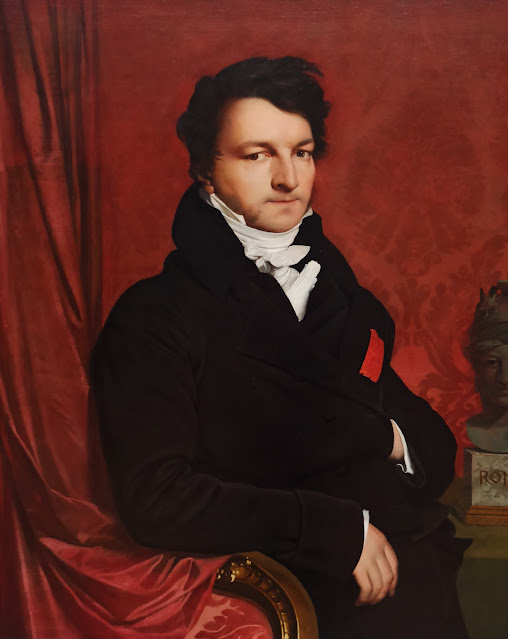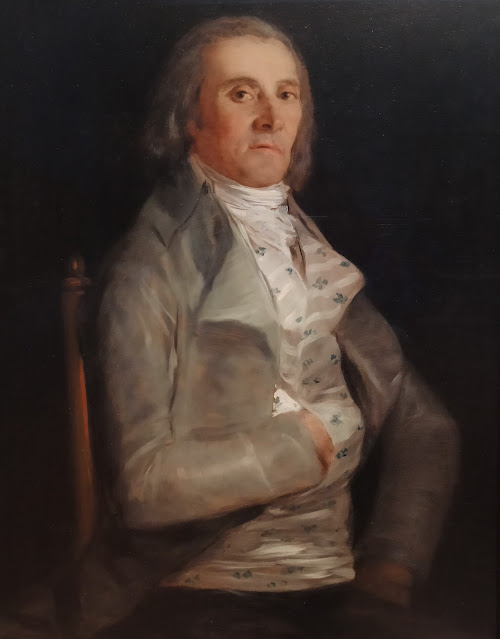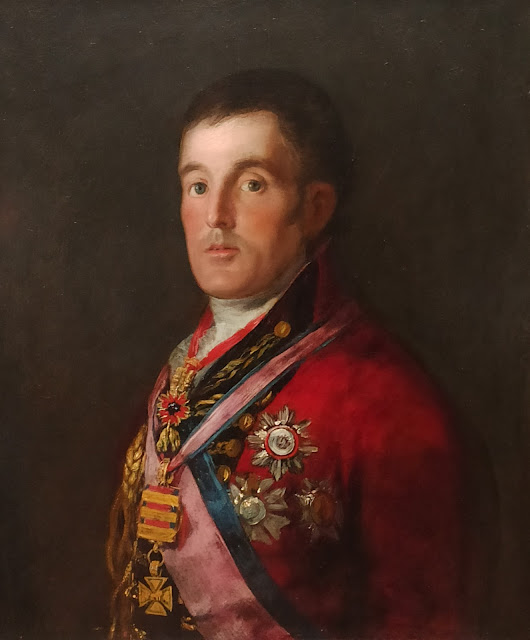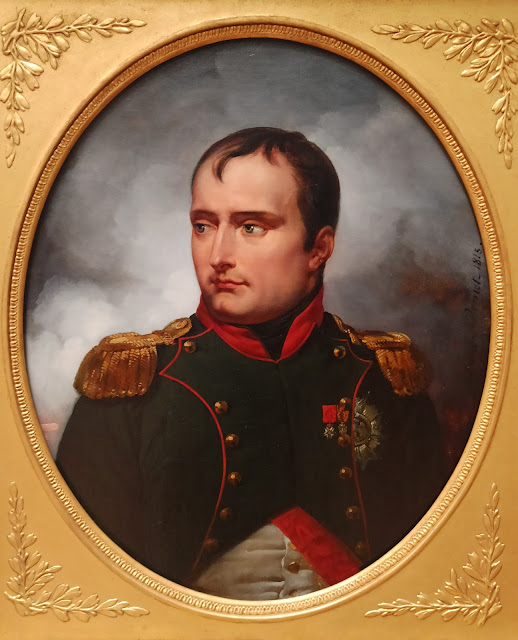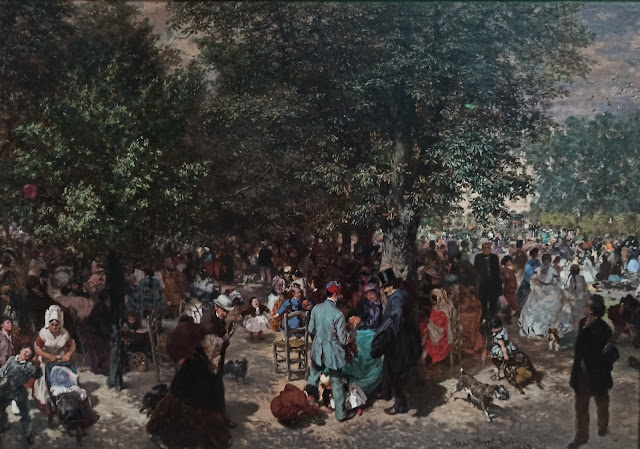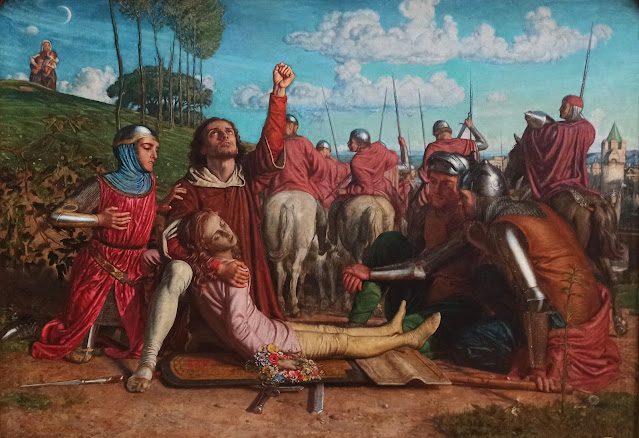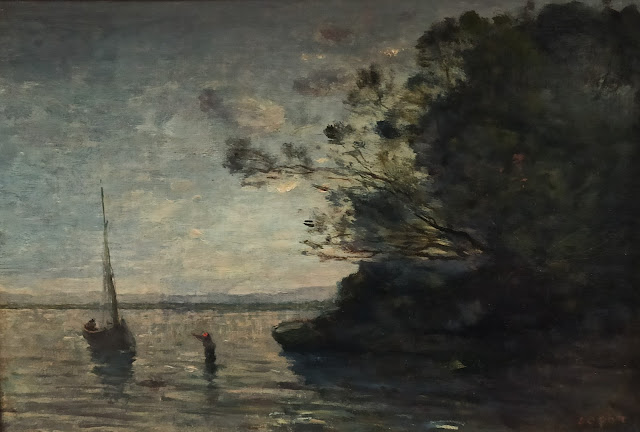This blog is a write up on room 45 of the National Gallery.
The art here focuses on the academic teaching of executing compositions of historical, mythological and religious subjects in the romantic tradition.
The overall Romantic movement - which includes artists like Francisco de Goya, Eugene Delacroix etc. - have a psychological and emotional depth that is evoked. For me, I have always been drawn to the 19th century romantic landscapes (e.g. JMW Turner). It's art trying to reach the sublime - that sense of awe when observing mankind against the power and majesty of nature shown in grand scale. In Europe, it was partially a response to the Industrial Revolution, and a yearning to return to the 'simplicity' of the open-air countryside, a form of escapism. When it comes to people; Francisco de Goya, as a great example, was able to exhibit humanity as a sublime force of its own.
✲✲✲
Monsieur de Norvins by Jean-Auguste-Dominique Ingres
Captivating - even beguiling.
There is a lot of depth to this painting.
The sitter is Monsieur de Norvins. He was made Chief of Police in Rome in 1811 - when it was painted. I.e. before Napoleon's fall in 1814.
His face is fascinating; body at an angle, his head and especially the eyes scrutinizes and studies us. Eyes seem to narrow slightly, and his lips closed and pursed, as if to curse. One eyebrow raised just slightly? I love his thick raggedy hair - quite dashing even. Altogether, he strikes me as being a somewhat guarded and even forbidding character. That red ribbon marks him as a Chevalier (Knight) of the Légion d'Honneur, which was the highest French distinction for military and civil accomplishments created by Napoleon.
The vibrancy in the colour is striking and sumptuous. Those 18th century silky-white shirts and neckerchief-cravats really look beautiful against his black greatcoat and opulent silky red-maroon curtains.
According to the NG:
Norvins was a supporter of the Emperor Napoleon – and later wrote a very successful four-volume biography of him – and his political allegiance is shown by the Napoleonic gesture of placing his left hand inside his jacket.
There is a very interesting article which delves into the later-concealed pentimentos of the Napoleonic period. The fall of Napoleon and the shift in power to the Bourbon monarchy meant it was dangerous to exhibit overt loyalties to the former Emperor.
✲✲✲
Don Andrés del Peral by Francisco de Goya
An engaging portrait - vulnerability and frailty leavened by a certain comfortable elegance.
The languid eyes, grey wispy hair, the left side of his face slightly drooping (perhaps an illness?).
It makes for an intriguing persona. It seems Peral - along with Goya - was employed at the royal court in Madrid. So, they must have known one another.
I am not sure if he's drawing something out of a pocket though. That's a classic Napoleon stance.
✲✲✲
The Duke of Wellington by Francisco de Goya
This is Arthur Wellesley. He was born in Dublin and became the first Duke of Wellington.
I think this painting captures something of Wellington. A certain cautiousness. Alertness. He is certainly not short of military awards.
After defeating Napoleon at Waterloo, the Duke of Wellington purportedly broke down in tears due to the appalling loss of the battle, and didn't care to be congratulated on his victory.
Here he is depicted after his liberation of Spain from the French at the battle of Salamanca in 1812.
✲✲✲
The Emperor Napoleon I by Horace Vernet
I really do love Napoleon.
The background smoke is apt. Those lone wisps of hair seem a bit peculiar on Napoleon; but Vernet captures a guy who isn't the most dashing - but has the feel of 'au destin'.
To me, it's his rags-to-riches story which is entwined in his legacy.
On the one hand, I know that Napoleon was very careful at curating his own image. He regularly misreported his losses among his men in battles, and frequently exaggerated the losses of his enemies. He was alive at a time when propaganda played a significant role in the upper echelons of military life and around the time of revolution. In other respects he was quite lucky because - by the time he began to rise - the French revolution had killed huge portions of the senior military officers. Also, a common misconception still resonates about Napoleon's supposed height. But this can be attributed to us, in Britain, pushing the idea that he was short, among other things.
On the other hand, he seems to have been genuinely remarkable - esp. during the time of Romanticism in art. He revolutionized warfare and military leadership through meritocracy and the corps system. Napoleon defeated coalitions of other European major powers - alone - during France's most extreme tumult & unrest. He lead expeditions to Egypt (giving us all the Rosetta stone), and then coronated himself as emperor.
The romantic fate: where, at the end, he lost everything and was imprisoned on a small island.
✲✲✲
Afternoon in the Tuileries Gardens by Adolph Menzel
Lovely.
What is very striking to me is how Adolph Menzel can capture the visual aesthetics of a summery French afternoon. Reminds me a bit of impressionism in this Paris gardens.
Adolph Menzel is an artist I don't know much about. I did a Google search and his other works seem v. beautiful.
Sheer detail: two children playing under their father's legs, a girl in the back crying, the shadow of the trees' branches and leaves.
✲✲✲
Rienzi vowing to obtain Justice for his Brother's Death by William Holman Hunt
You cannot mistake the subject of this painting.
Cola di Rienzi (1313-54) was a Roman who declared the reestablishment of the Roman Republic. He sought to represent the populace of Rome against the wily machinations of the nobles that dominated the city. Here, his youthful and indomitable spirit is clear. Clinched fist, youthful champion of the peoples against the barons; only to be counterposed by the horses' backsides against them.
The brother as blond and youthful, innocent-like, with wreath of flowers in his hand. Strange that the brother is the only one furious. The other soldiers - towards the fore - merely observe nonchalantly and whisper to themselves.
Signifying the end of innocence?
✲✲✲
Evening on the Lake by Camille Corot
Evokes the quiet, gloomy and elegiac.
The unwinding of a lovely sunny afternoon (boat coming into shore) - with its inherent nostalgia - as the sun sets, and darkness creeps in. I really do love the calm & unruffled waves painted across this lake and its shimmering reflections.
It's unsettling a bit; and a bit peaceful.
I like that red dot, a red chapeau on the fisherman's head?
I think we can see Corot's influence on impressionists and the en plein air style. I remember he was Berthe Morisot's art teacher.

